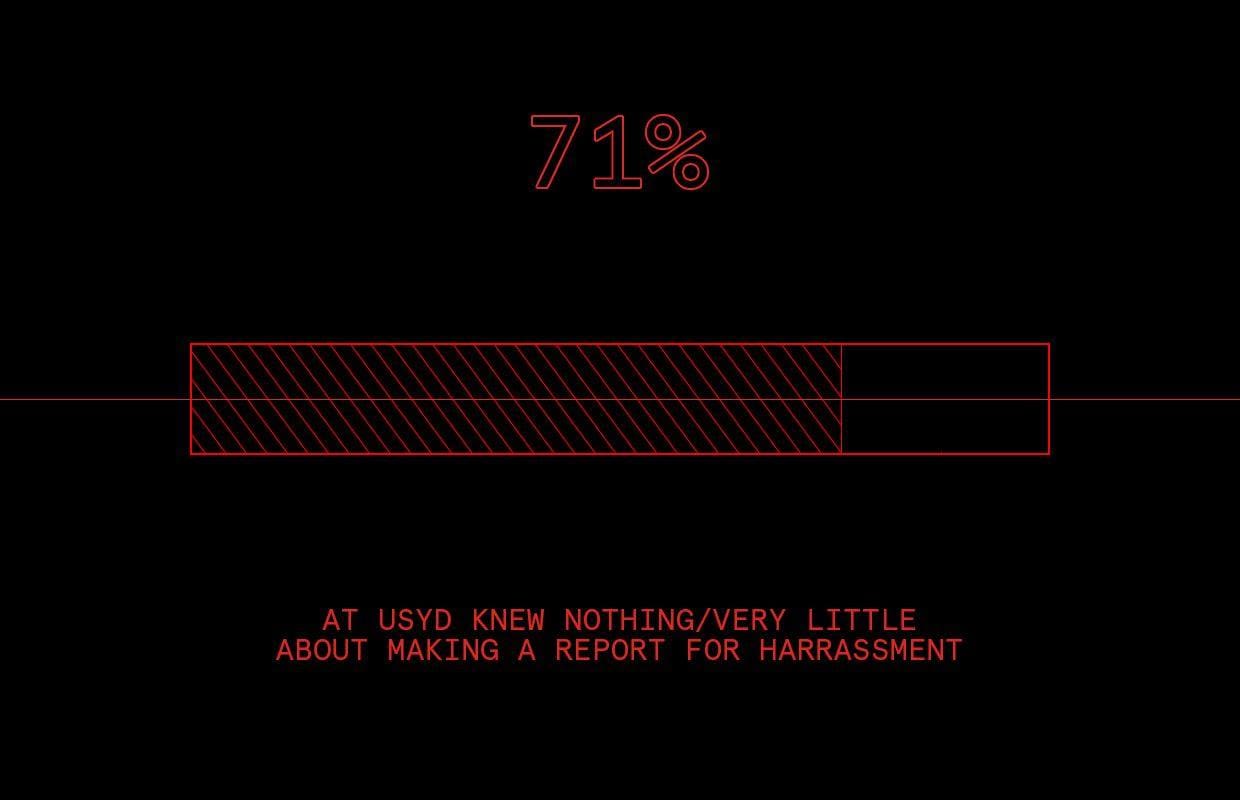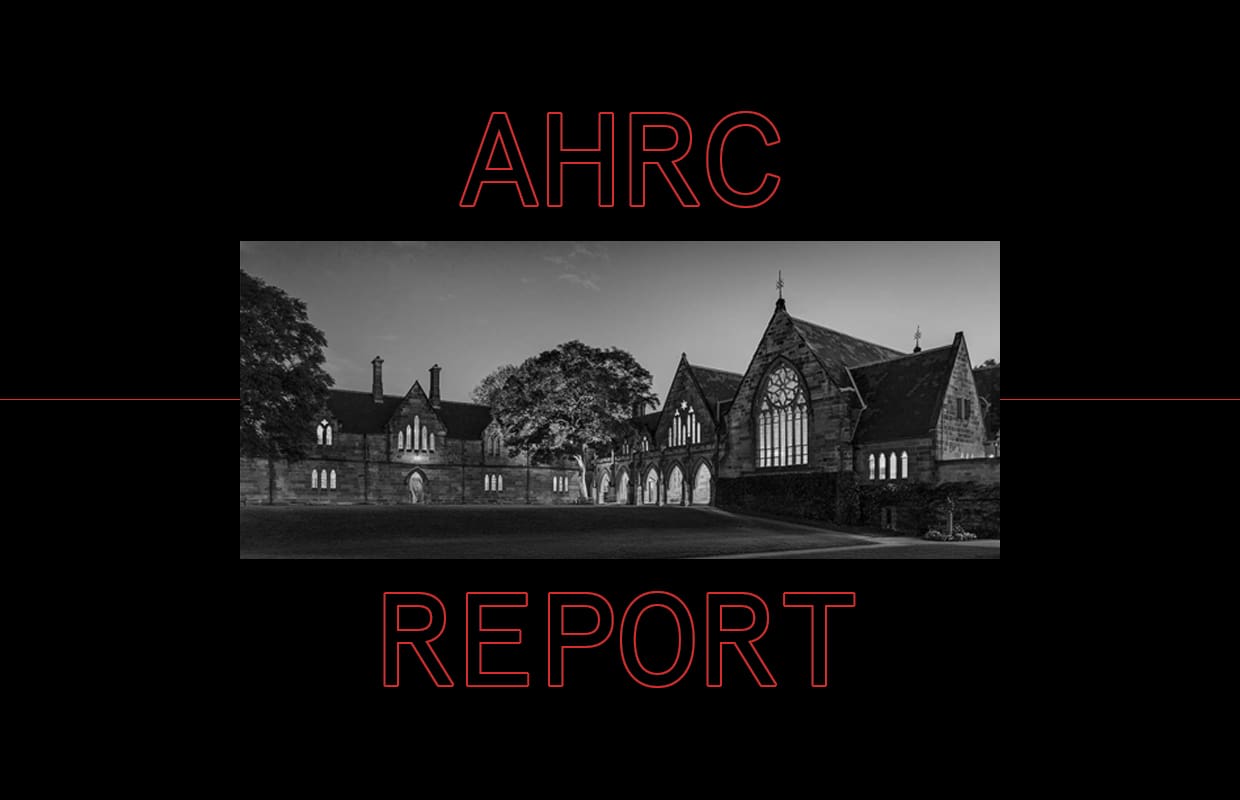Key Statistics
- 31 per cent of surveyed USyd students were sexually harassed in a university setting in 2016. Over half said they have experienced sexual harassment in general. This is higher than the national statistic, 26 per cent.
- Over two per cent of surveyed USyd students had been sexually assaulted at the University. This is higher than the national statistic; the Commission’s national report found 1.6 per cent of participants reported they had been sexually assaulted in a university setting in 2015 or 2016.
- Of the students surveyed, 10 times more women reported being sexually assaulted than men.
- 71 per cent of surveyed students said they didn’t know how to make a report for sexual assault or harassments.
- Men at USyd were seven times more likely to seek support services than women.
A higher percentage of students at the University of Sydney have experienced sexual assault or sexual harassment than the national average, the Australian Human Rights Commission national survey reports.
31 per cent of surveyed USyd students were sexually harassed in a university setting in 2016, and over half said they have experienced sexual harassment in general. By comparison, the national report found 26 per cent of students across Australia were sexually harassed in a university setting, which includes travel.
71% at #USyd knew nothing or very little about making a report for harassment (versus 60% national average) #AHRCresults
— Honi Soit (@honi_soit) August 1, 2017
While the University of Sydney’s individual report dedicates almost ten pages of its thirteen-page document to discussing data relating to sexual harassment in detail, data on sexual harassment are confined to less than two pages. Readers aren’t privy to the reported reasons students didn’t make a formal report or complaint about their sexual assault, who the perpetrator was, or where the assault occurred, despite the fact this information is provided for incidences of sexual harassment and was collected in the survey.
Students at the University of Sydney were also less likely to know how to access support services compared to the national average.

When asked why they didn’t seek support services, women were four times more likely than men to avoid seeking support for their sexual harassment at USyd because they did not want to hurt the offender or get them into trouble.
Women were four times more likely than men not to seek support for sexual harassment because they were worried no one would believe them. Three times more women than men said they didn’t seek support from the university because they feared the sexual harassment was too difficult to prove.
not surprised but its still painful. USYD has a toxic culture when it comes to sexual harassment and assault that needs to be changed! https://t.co/2sUQSyBKI5
— im on my ray! 🦂 (@garfieldlover69) August 1, 2017
USyd Student Representative Council Co-Wom*n’s Officer Imogen Grant said the university’s reporting mechanisms can often increase the level of stress on survivors.
“This year I have had many students disclose their experiences of sexual assault. They’ve told me about how navigating the university bureaucracy exacerbates trauma and often seems futile,” said Grant.
“Survivors continue to report that they feel discredited, silenced, and their abuse minimised or disbelieved.”
The University of Sydney has faced ongoing criticism for how it has addressed issues of sexual assault and discrimination. A letter obtained by Honi revealed the University of Sydney objected to police releasing information about an attempted assault on campus last year in the name of “public interest” earlier this year. Campus security also removed posters advocating for a greater university response to sexual assault on campus at the last info day.
The University will implement all eight of the Australian Human Rights Commission’s recommendations, as outlined in the national report, Vice-Chancellor Michael Spence said.
“Our University is deeply committed to that responsibility and to eliminating intimidating, abusive, disrespectful or threatening behaviour from our campuses and the communities we serve,” University of Sydney Vice-Chancellor Michael Spence said.
71% of #USyd students who did not seek support for harassment “did not think it was serious enough” (national average 68%) #AHRCresults
— Honi Soit (@honi_soit) August 1, 2017
“The University of Sydney will implement all of the recommendations contained in the report, and we will meet with students and staff over the coming weeks to discuss the detailed statistics and the University’s ongoing response.”
However, according to the University’s website, USyd has only committed to following Universities Australia’s Respect.Now.Always 10-point action plan, not the AHRC’s official recommendations as contained in the national survey report.
While there is overlap in the recommendations from Universities Australia and the AHRC, including developing relationships with external services, and educating staff and students about sexual assault and harassment. But the University of Sydney has not committed to undertaking steps exclusive to the AHRC’s report, which include undertaking an expert led review of their institution’s existing policies and response pathways, and establishing a committee comprised of University officials and student representatives to oversee the implementation of these initiatives.
If you have experienced sexual assault or sexual harassment and feel you would like to speak to someone for support or information, NSW Rape Crisis Centre (Phone: 1800 424 017) can provide counselling 24-hours a day, 7 days a week.
A new national University Support Line is available: 1800 572 224
The support line will be available 24 hours a day, 7 days a week. It will operate until 30 November 2017.





